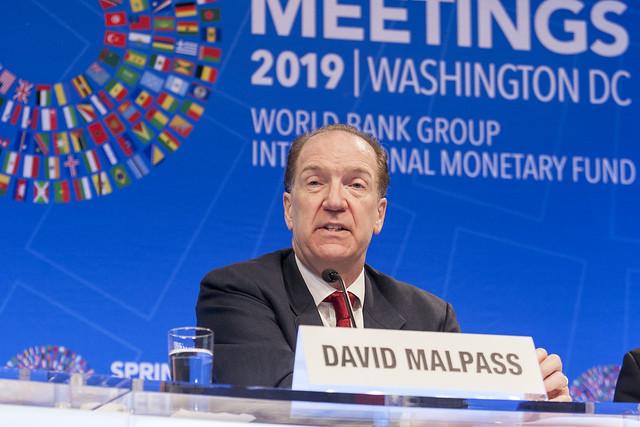
Everyone agrees that the mission, of shared prosperity, of better economies in developing countries is a common goal, so we can work together on that to have as many resources available especially where good country programs are being developed.”
Kemi Osukoya
April 11, 2019
The World Bank Group‘s new President David Malpass said by 2030, Africa will have the highest concentrated numbers of people living in extreme poverty, with nearly nine in 10 extremely poor people living in Africa, and half of the world’s poor will be living in fragile and conflict-affected countries.
“This calls for urgent action—by countries themselves and by the global community,” said Mr. Malpass during a press conference on Thursday. “This fact is extremely troubling because it jeopardizes the World Bank’s primary goal of ending extreme poverty by 2030.”
According to the World Bank’s latest report released Thursday, extreme poverty has dropped to 700 million globally, down from much higher levels in the 1990’s and 2000’s. Global growth lost momentum in 2018, dropping to 2.7 percent in the fourth quarter down from 3.3 percent in the first quarter. The decline was seen in both advanced and developing economies and coincided with three other warning signs: Waning structural reforms in major economies; financial stress in some large emerging markets; and elevated policy uncertainty globally.
In sub-Saharan Africa, the number of people living in extreme poverty is on the rise in and per capita income growth as a whole is now projected to stay below one percent until at least 2021, which elevates the risk of a further concentration of extreme poverty on the continent. Growth in median income will also be weak.
Mr. Malpass cited China, one of Africa’s biggest trading partners, as an exemplary model nation that has successfully reduced extreme poverty among its people. “In China, as many as 850 million people are no longer in extreme poverty as the median income in China went up over these decades. And, so that’s an achievement. So, China has some lessons to share and insights to share with the rest of the world,” said Mr. Melpass.
Mr. Malpass added that while China has been successful at lifting most of its population out of extreme poverty, its trade programs abroad might leave a lot less desirable in terms of “the importance of transparency of the debt, of the quality of the projects, the coordination with other donors. And the reason for that is because we want the countries, the borrowing countries, to do well, to have good outcomes.”
Mr. Malpass, who worked in the U.S. government as a part the Trump administration’s trade negotiating team with China before taking the helm as president of the World Bank this month said the Bank and China “share a common view that poverty alleviation, that shared prosperity are key goals of what the World Bank should be doing, but also what nations around the world should be trying to do.”
“One of my key goals at the World Bank is to see us achieve breakthroughs where countries that either have a high amount of extreme poverty or too little sharing — shared prosperity — can do much better, as part of an effort by the World Bank. So, that’s one of the things I’ll be focusing on,” said Mr. Malpass.
Mr. Malpass also stated that among his other goals for the Bank is to ensure and help foster inclusive growth to close gender inequality gap, globally, signaling to the global community that he plan to continue working on the important programs his predecessors have established as well as seek new solutions to old problems.
Underscoring that most African nations still have a long way to go in terms of full gender inclusion in integrating women fully into the economy, he indicated that country like Egypt, while unemployment has gone down to 9 percent in Egypt as well as inflation, overall human capital investments and full gender inclusion in the society and economy are still lagging behind other nations.
“One of the key things in getting good growth in countries is full inclusion of women in the economy. This is a huge resource. It’s particularly apparent in Africa, and is something the Bank is working hard on, both from the standpoint of having women have legal rights that are full and that are effective within the economy, but then also to be able to participate fully in the economy in real — in small businesses, in employment. All of those are progress,” said Mr. Malpass.
Ms. Malpass’ urgent call to action underscored a major theme in discussions taking place during the World Bank and International Monetary Fund Spring meetings this week where many of the panel discussions centered around how to improve investments in human capital to ensure countries have sustainable economic growth for the foreseeable future.
He said the Bank plan to work with the African Development Bank as well as other development banks, including EBRS, Asian Infrastructure Investment Bank, and Asian Development Bank to address the issue of poverty in sub-Saharan Africa by deploying more resources and programs.
“More resources sometimes will help better programs often, maybe almost always will help, so one of the things we want to do is to have as effective a country program as we can. Part of that is coordination with other multilateral donors,” said Mr. Malpass, adding that “everyone agrees that the mission, of shared prosperity, of better economies in developing countries is a common goal, so we can work together on that to have as many resources available especially where good country programs are being developed.”



